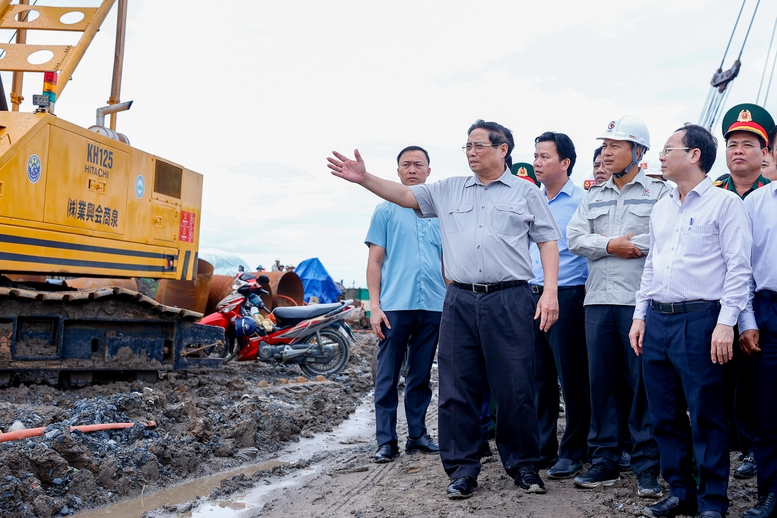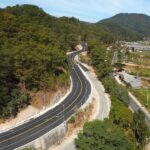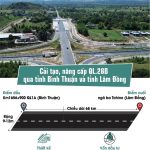
Prime Minister Pham Minh Chinh inspects the construction progress of the Chau Doc-Can Tho-Soc Trang Expressway Project at the Lo Te- Rach Soi interchange (Thanh Tien, Vinh Thanh, Can Tho) on July 13, 2024 – Photo: VGP/Nhat Bac
On July 12-13, 2024, Prime Minister Pham Minh Chinh worked with the Mekong Delta provinces, directly inspecting the construction sites of the Can Tho – Ca Mau Expressway Project, Component 2 and Component 3 of the Investment Project for construction of the Chau Doc – Can Tho – Soc Trang Expressway; in the afternoon of July 13, 2024, in Can Tho city, the Prime Minister chaired a meeting to address difficulties and obstacles for key transport projects in the Southern region.
Prime Minister Pham Minh Chinh appreciated the importance of investing in key transport projects, including expressways in the Southern region, to concretize the goals set by the 13th Party Congress. Along with the synchronous development, renovation, expansion, and upgrade of ports and airports, these projects aim to complete a relatively comprehensive transport system and implement solutions to cope with climate change, subsidence, erosion, drought, and saltwater intrusion in the Mekong Delta region. These projects are expected to facilitate and promote the development of local provinces and the whole region, contributing to the country’s overall development.
On behalf of the Government, the Prime Minister acknowledged and highly appreciated the proactive participation, efforts, and dedication of ministries, sectors, localities, project management units, businesses, contractors, and supervisors, especially the team of engineers, workers, and employees working directly at the project sites. He also expressed his gratitude to the families, local people, and communities who actively supported and quickly handed over the land for construction. Local authorities demonstrated strong political determination, unity in awareness and action, and great efforts to overcome challenges and focus on directing and resolving difficulties and obstacles to ensure the progress of the projects. A unanimous decision was made to address the most challenging issue of arranging sufficient filling materials for road construction, striving to complete about 600 km of expressways in the Mekong Delta region during the period of 2021-2026. This will create a foundation for continuing to invest in and build expressways in the region according to the master plan in the following period.
Up to now, in addition to the significant achievements, the implementation of the projects still faces certain limitations, inadequacies, and difficulties. Land clearance has not been completed for some projects; although the remaining work is not large in scale, it is challenging. If not resolved by July 2024, it will significantly affect the progress of the projects.
The management and coordination of filling materials supply in some places have been cautious and untimely, causing shortages and delays in project implementation, while in some other places, it has been loose and irresponsible, leading to violations that need to be handled.
The main reasons for the above limitations and inadequacies are the slow implementation of the Government and the Prime Minister’s directions in some places and by some agencies; the lack of proactiveness and initiative of some localities in performing their assigned functions, tasks, and authority; and the inadequate and unthorough research of advisory agencies in proposing solutions to local leaders for directing and managing the implementation of the projects. Information, communication, and publicity have been inaccurate, incomplete, and untimely in some cases, failing to create a high consensus among the people, businesses, agencies, and units in implementing the projects.
Important Lessons Learned
Based on the practical experience in leading, directing, and managing the implementation of the projects, some important lessons can be drawn. To fulfill the assigned tasks well, ministries, agencies, localities, and especially their leaders must enhance personal responsibility, putting the interests of the nation and the people first. They should always listen, learn, and improve themselves while promoting a sense of responsibility.
State management and corporate governance must be flexible and adaptable to the requirements, tasks, and practical situations, promoting digitization and smart solutions to reduce red tape and administrative procedures, thereby reducing costs for people and businesses.
It is necessary to pay attention to promoting the spirit of unity, support, and sharing between state management agencies, Party committees, local governments, businesses, and people, especially mutual support between localities in terms of common construction materials. If one locality completes its project while another does not, the efficiency of the expressway will not be optimized.
In performing tasks and addressing difficulties, it is essential to boldly and creatively apply the guidelines, policies, and laws of the Party and the State, maximizing the unique potential, outstanding opportunities, and competitive advantages of each locality for rapid and sustainable development. We should strive to “turn nothing into something, turn difficulties into advantages, and turn impossibilities into possibilities,” promoting self-reliance, self-improvement, and efforts to overcome challenges.
At the same time, it is crucial to continue doing well in information and communication, especially policy communication, to ensure objectivity and honesty, contributing to social consensus. The principle of “People know, people discuss, people do, people inspect, people supervise, and people benefit” should be upheld.
The target is to complete 3,000 km of expressways nationwide by 2025, with the Mekong Delta region striving to complete about 600 km to respond to the movement of “500 days and nights of focus on completing the victory of expressway projects” to celebrate Party Congresses at all levels, towards the 14th National Party Congress, the 80th anniversary of National Day, and the 50th anniversary of the liberation of the South and national reunification. The early completion of expressway projects will significantly contribute to creating new development spaces, new industrial parks, new urban areas, new service areas, new values, and new jobs, improving the income and livelihood of local people in particular and the whole country in general.
Complete Land Handover for Expressway Projects in July 2024
Regarding the key tasks in land clearance, the Prime Minister requested the Chairpersons of the People’s Committees of the provinces and cities of Dong Thap, An Giang, Can Tho, Hau Giang, Bac Lieu, Soc Trang, and Ca Mau to direct the relevant departments, branches, and local authorities to expedite the progress and fulfill their commitments to complete the land handover for expressway projects in their respective areas in July 2024. Kien Giang province, in particular, needs to complete the procedures and hand over the entire land for the Rach Soi – Ben Nhat and Go Quao – Vinh Thuan sections of the Ho Chi Minh Road Project by July 31, 2024. Tien Giang province should complete the land handover for Component 2 of the Cao Lanh – An Huu Expressway Project before September 30, 2024.
The Prime Minister requested the Minister of Industry and Trade and the Chairman of the State Capital Management Committee to direct the Vietnam Electricity Group (EVN) and local electricity companies to urgently relocate technical infrastructure works related to the power sector before July 31, 2024, to ensure the timely implementation of key transport projects in the Southern region and the country. EVN must take full responsibility to the Government and the Prime Minister if the slow relocation of power infrastructure causes delays in the progress of key transport projects in the Southern region and the country.
Apply the Most Favorable Mechanism to Ensure Sufficient Material Supply
Regarding construction materials, the Prime Minister requested the Minister of Transport, especially the Minister of Natural Resources and Environment, to continue instructing and supporting localities with filling materials for road construction (An Giang, Dong Thap, Vinh Long, Tien Giang, Ben Tre, Soc Trang, etc.) to proactively and urgently solve issues related to mining licenses, increase mining capacity when conditions are met, and extend mines in accordance with their authority and the provisions of law.
The Prime Minister noted that during the process of solving these issues, no regulations should be imposed that hinder the supply of filling materials, delay project progress, or increase project costs.
The Chairpersons of the People’s Committees of localities with filling materials (Tien Giang, Ben Tre, Vinh Long, Dong Thap, Soc Trang, An Giang, etc.) and localities in need of filling materials (Ho Chi Minh City, Binh Duong, Dong Nai, Ba Ria – Vung Tau, Can Tho, Hau Giang, Ca Mau, etc.) should proactively coordinate, apply all specific mechanisms and policies, and create the most favorable conditions to ensure the supply of filling materials according to the assigned targets and commitments (in terms of reserves and capacity). They should also ensure the completion of licensing procedures in July 2024 to start mining operations in August 2024 and consider flexibly coordinating the supply of filling materials according to the progress of the projects in accordance with the law.
Investors, Project Management Boards, contractors, and supervisors should closely monitor the work and proactively coordinate with the People’s Committees and departments of localities to promote the progress of resolving filling material supply issues.
The Chairpersons of the People’s Committees of An Giang, Kien Giang, Dong Nai, Binh Duong, Binh Phuoc, Tay Ninh, and Ba Ria – Vung Tau provinces should promptly decide within their authority on licensing and increasing the mining capacity of stone mines to serve the expressway projects in the Mekong Delta region, especially the Can Tho – Ca Mau Expressway and the Chau Doc – Can Tho – Soc Trang Expressway. Investors, Project Management Boards, contractors, and supervisors should promptly complete the necessary procedures and proactively coordinate with localities with stone and sand sources to resolve issues related to the supply of construction materials for the projects. At the same time, the Mekong Delta provinces should actively support the Eastern region provinces in providing filling materials (river sand and sea sand) upon request.
Mobilize Maximum Human Resources, Machinery, and Modern Equipment to Shorten Project Completion Time
Regarding construction, the project management agencies should direct investors and project management boards to instruct contractors and supervisors to mobilize maximum human resources, machinery, and modern equipment, improve processes, and work with the spirit of
“overcoming the sun, winning the rain,”
“only discussing doing, not discussing backing down,”
“3 shifts, 4 groups,” “eat in a hurry, sleep in a hurry,” “through holidays, through Tet, through days off,”
“do one thing at a time,”
solve problems at the point of difficulty, and overcome challenges together. They should strive to complete the projects ahead of the planned schedule.
Contractors and supervisors should actively support and assist local businesses in terms of management and construction organization to develop together, build confidence, and enhance their capacity to undertake large-scale projects in the region in the future.
Consulting units, especially supervisors, should enhance their professionalism and independence, closely monitor the construction sites, promote project progress, ensure quality, and comply with technical and aesthetic requirements and labor safety regulations according to the law.
Focus on Propagating Good Lessons, Exemplary Individuals, and Heroic Sacrifices of Engineers, Workers, and Employees
Regarding information and communication, the Prime Minister requested the Central Propaganda and Education Committee, the Ministry of Information and Communications, and the People’s Committees of localities to direct press agencies to strengthen propaganda on the Party’s guidelines and the State’s policies and laws on investing in the development of transport infrastructure. They should focus on propagating good lessons, exemplary individuals, and heroic sacrifices of engineers, workers, and employees who
“overcome the sun, win the rain,”
and
“only discuss doing, not discussing backing down”
in construction sites, as well as the consensus and support of the people. This will contribute positively to preventing and repelling negative information and hostile forces’ plots.
Regarding issues that have not been handled well, it is necessary to provide objective and truthful information, along with solutions, to avoid reporting only on difficulties and obstacles, which may lead to controversial public opinions and negatively affect project implementation.
Ensure Effective Support and Resettlement, Improving People’s Lives in the New Residence
The Prime Minister proposed that Party committees and requested local authorities continue to effectively support and resettle people, taking care of their material and spiritual lives. It is essential to ensure that people’s livelihoods in the new residence are better than in the old one so that they can confidently support the Party and State’s policies in investing in socio-economic infrastructure development.
Local authorities should direct agencies, units, and socio-political organizations to support and accompany contractors on construction sites in all aspects, both materially and spiritually, so that engineers, workers, and employees do not feel “alone on the modern expressway construction site.”
At the same time, it is crucial to maintain security, social order, and political stability in project areas, especially along the project routes, and prevent corruption in projects under their management.
Local authorities should proactively coordinate with relevant agencies and units and between localities to promptly resolve arising difficulties and ensure project progress, quality, environmental hygiene, technical and aesthetic requirements, and labor safety.
Which 19 projects will the Ministry of Transport start in 2024?
The 2023 conference and 2024 plan implementation of the Ministry of Transport have identified that one of the key tasks of the Ministry in 2024 is to effectively invest in the development of the national transportation infrastructure. This includes the commencement of 19 major infrastructure projects in 2024.



















